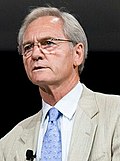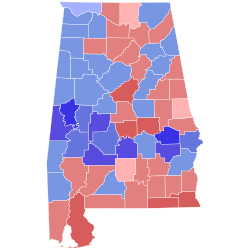Campaign
The closeness of the general election contest was reflected in its intensity and fervor. At one point in the campaign, a clash erupted between the two principal campaigns over disclosure of the identities of large contributors to the Riley campaign. President George W. Bush appeared in Alabama at a July event, and a private reception with a $50,000 admission was held to benefit the Riley campaign. Riley's campaign initially refused to identify the donors attending the event. Later, under pressure from the Siegelman campaign, Riley called on the national Republican Party, which had hosted the event, to release the names of donors. [3] The Riley campaign was subjected to editorial criticism when the voluminous reports released made it difficult to trace the sources of donations from the event to Riley. [4]
During the campaign, actor and National Rifle Association president Charlton Heston came to Alabama to campaign for Republican congressional candidates. While in the state, Heston released a written statement endorsing Siegelman, despite the fact that Riley had made a point of being seen in public with Heston. Spokesmen for both Riley and the Alabama Republican Party issued statements insinuating that Siegelman had taken advantage of Heston's recently diagnosed Alzheimer's disease to secure the endorsement. After a firestorm of criticism from the NRA and editorial pages, the Republican spokesmen apologized to Heston, but not to Siegelman. [5]
Riley received the endorsements of The Birmingham News , [6] the Mobile Press-Register , the Business Council of Alabama, and the Auburn University Trustee Improvement PAC, an alumni group which opposed Siegelman's choices for trustees at the school (Siegleman re-appointed controversial trustee Bobby Lowder, notorious for constant interference in the university's affairs). [7] In addition to the NRA, Siegelman was endorsed by The Montgomery Advertiser , The Anniston Star , The Tuscaloosa News , and various labor groups, including the Alabama State Employees Association. [8] Siegelman was also endorsed by Alabama Education Association executive secretary Paul Hubbert, although the Association itself remained officially neutral. [9]
The campaign set new spending records for an Alabama gubernatorial race. Even before the final weeks of the campaign, the candidates had raised over $17,000,000. Riley, who raised and spent over twice the sum Siegelman raised, was primarily backed by business groups and insurance companies. Siegelman received substantial contributions from labor groups and affiliates of the Alabama Education Association. Both candidates were the beneficiaries of national party funding, and contributions from political action committees made donations to both candidates difficult to trace. [10]
Polls taken in the final days of the campaign reflected the eventual close outcome. [11]
Results
Initial returns showed Riley narrowly losing to Siegelman. Siegelman gave a victory speech on election night, and the Associated Press initially declared him the winner. [14]
However, officials in Baldwin County conducted a recount and retabulation of that county's votes after midnight, and after Democratic Party observers had gone home for the night. [15] Approximately 6,000 votes initially credited to Siegelman were either removed from the total or reassigned to Riley in the recount, turning the statewide result in Riley's favor. [16] Local Republican officials claimed the earlier returns were the result of a "computer glitch." [17]
Democratic requests to repeat the recount with Democratic observers present were rejected by Alabama courts and then-Attorney General Bill Pryor. Siegelman and his supporters complained that these judges (and Pryor) were either elected as Republicans or appointed by Republican presidents. [18] After over a week of fights in courtrooms and in the media, Siegelman, on November 18, 2002, made a televised address, saying that, "I've decided that a prolonged election controversy would hurt Alabama, would hurt the very people that we worked so hard to help", and abandoned his efforts to secure a recount of the Baldwin County vote, allowing Riley to take office. [19]
Counties that flipped from Democratic to Republican






